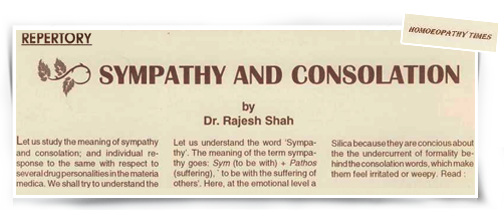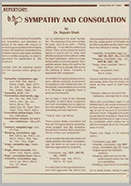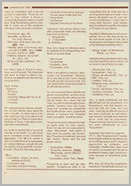Sympathy and Consolation
Let us study the meaning of sympathy and consolation; and individual response to the same with respect to several drug personalities in the materia medica. We shall try to understand the probable reasons why some remedies desire or dislike sympathy; in order to apprehend the significance of symptoms.

Sympathy and Consolation
by Dr. Rajesh Shah, M.D.
Homeopathy Times,Vol.1, No.3, 1994
Let us study the meaning of sympathy and consolation; and individual response to the same with respect to several drug personalities in the materia medica. We shall try to understand the probable reasons why some remedies desire or dislike sympathy; in order to apprehend the significance of symptoms.

Carefully refer the following rubrics from the repertory before going further:
*Sympathy, compassion, agg:
Cact., Coff., Hell.,Nat-m., Sabad., Sulph., Syph. (S.R.) Ars., Bell.,Calc., Ign., Nat-m.,Plat.,Sabad.,Sepia.,Sil.
*Sympathy, aversion to:
*Consolation, kind words, agg:
Am., Ars.,Aur., Bell.,Catc., Calc-p., Carc., Ign., Lyc., Nat-m., Nit-ac., Plat., Sabal., Sep., Sil., Syph., Tam., Sulph., Thuj., Arg- n., kali-s.
- Consolation makes angry: Sabd., Sen. (Vithoulkas)
- Consolation refuses, for one’s own misfortune: Nit.ac (Ph- R)
- Sadness, sympathy agg: Con.(Ph.Rep)
- Weeping, consolation, agg: Bell., Calc-p.,Kali-C., Lyc., Nat-m., Nux-v., Plat., Sep., Sil., Tarn., Thuj., Staph.,
- Anger, sympathy agg: Sabal., Ferr.
- Anger, when consoled: Ars., Cham., Hell., Nat-m., Sabal.
- Rage: consolation from: Nat-m.
- Irritability, consolation, agg: Calc-p., Ign., Nat-m.,Nit-ac., Sep., Sil., Sabal.
*Sympathetic
Let us understand the word 'Sympathy'. The meaning of the term sympathy goes: Sym (to be with) + Pathos (suffering), 'to be with the suffering of others'. Here, at the emotional level a person is moved and he really feels affection and pain for the sufferer. Unlike the word 'consolation', which is an intellectual action or a formal gesture. Sympathetic person shares the grief for the sufferer, and he is actually affected by the suffering of others. Sympathy is associated with compassion.
Consolation is merely a passive assurance without personal involvement. Consolation is the intellectual offer of kind words. Fewer emotions are involved in it. Whereas in sympathy there is personal involvement. Let us have a look at the following remedies, in which there is aggravation from consolation but no aggravation from sympathy. This is something interesting and also important.
- Calc-p., Carc, Lyc, Nit-ac.
These people dislike consolation but they are not aggravated by sympathy, (most probably they like sympathy, though this is unsaid). At the same time all four of them are 'sympathetic'
Let us consider the remedies which are highly graded in the rubric 'consolation, agg.' but which do not seem to be as intensely aggravated by sympathy.
- Consolation, agg: SEP., NAT-M., Sil., Syph.
- Sympathy, agg: Sep. (Ph.R), Nat-m., Sil., Syph.
It is clear that it is the superficial assurance that aggravates Sep, Nat-m and Silica because they are conscious about the undercurrent of formality behind the consolation words, which make them feel irritated or weepy.
Read:
- Irritability, consolation, agg: Lyc, NAT-M., SEP., Sil., Hell, IGN
- Weeping, consolation, agg: Lyc, Nat-m., Sep., Sil.
- Anger, when consoled: Nat-m., Hell, Ars.
- Rage, consolation, from: Nat-m (only)
It seems that Hat-m people feel angry and weepy when they are being consoled, as they seem to loath being pitied.
- Delusion, pitied on account of his misfortune, and wept: Nat-m. (Only)

Silica and Lycopodium seem to get irritated due to dry words of assurance as their sense of self respect and/or ego is hurt on account of consolation offered to them. Pulsatilla feels better by any kind of consolation. Sepia feels irritated (and there is no rage or anger) by consolation, which makes her cry with lot of despair about her miserable state of mind.
Please note Sepia, in the following rubrics:
- Consolation, agg: SEP.
- Irritability, consolation, agg: SEP.
- Anger, consolation agg: (No sepia)
- Despair about her miserable existence
- Weeping, feels nervous that she would scream unless she held on to something
- Shrieking must hold on to something
Let us study Arnica. Arnica is aggravated by consolation and it is not aversion to sympathy. 'Touch me not' and 'I'm Okay' attitude of Arnica is observed at physical as well as mental level. Note the following rubrics carefully to make use of this wonderful remedy for extra - traumatic conditions.
- Consolation, agg: Arn
- Sympathy, aversion to: Arn. (Only)(Hering)
- Well, Says, when he is very sick: ARN., Apis
- Irritability, sends doctor home, says he is not sick: ARN.,Apis., CHAM.
- Delusion, well he is: ARN.
- Delirium, declares, she is well: Arn., Apis., Ars.
- Refuses to take medicines: Arn., LACH
- Read: Arnica:
- Egotism
- Obstinacy
- Haughty
- Dictatorial, talking with the air of command
- Rudeness
Nit. Acid person also refuses consolation. He has definite ideas about his state of health. He feels that it is his own misfortune and consolation is not going to help him. There is tremendous obstinacy in Nit-ac, from which arise rigid ideas and altitudes.
It is worth noting that Nit-ac has great "Anxiety about health" but still he refuses consolation; in fact, consolation aggravates. Poor Nit-acid patient is often misunderstood by homeopaths as 'always malicious'; actually Nit-acid can also be very sympathetic and sentimental.
Study the following rubrics:
Nit.ac.:
- Consolation refuses, for one's misfortune (Ph.R.)
- Consolation, agg.
- Caressed, aversion to being
- Obstinate (unmoved by apology)
- Anxiety about health (kali - Ars)
- Sympathetic
- Sentimental
- Anguish, from loss of his friend
Carcinosin, Nux- vomica, Natrum-mur and Lycopodium share the following important symptoms:
- Sympathetic
- Consolation
- Fastidious
Now, let us study the following rubrics to understand the distinguishing characters of several drugs.
- Affectionate
- Sympathetic
- Sympathy, amel
- Consolation, amel
What is the difference between 'Affectionate' and 'Sympathetic'? Affectionate is one who is kind, warm, friendly and soft; one who cares sincerely. One can easily feel the emotional warmth of an affectionate person.
It is not necessary that an affectionate person is sympathetic, and vice versa. On comparing the two rubrics we find that Sil, Staph. Ant.c, Anac, Plat and verat. Are affectionate though not sympathetic.'Similarly, Lach, lod, Cicuta, Coca and tarantula are sympathetic but not affectionate. Here, sympathetic attitude of Lachesis and Tarentula, snake and spider should be noted.'
Phosphorus has been listed in the highest grade under the rubric 'Sympathetic' but only with one mark under the rubric 'Affectionate'. Kent seems to have done the grading very thoughtfully. Phosphorous believes in give and take dictum. Please refer the well known rubrics:
- Sympathetic: PHOS.
- Sympathy, desire for: PHOS.
- Affectionate, returns affection: Phos. (only)
- Consolation, amel: Phos., PULS.
Phosphorus is warm and can offer warmth. Phosphorus likes to be magnetized and he could also be a good hypnotherapist or a healer. Phosphorous physicians can be very good successful practioners ! I have seen a crying baby become quiet immediately on feeling the warmth in hands of phosphorous grandfather.
Pulsatilla is affectionate as well as sympathetic like Lyc. We shall not discuss the well known picture of Pils. But, it would not be out of place to have a look at the following interesting rubrics:
- Abrupt, rough, yet affectionate: PULS., Lys, Nux.v
- Pulsatilla and Lycopodium share many important symptoms and emotions.
Let us record a few of the as under:
- Affectionate: Puls, Lyc
- Sympathetic: Puls, Lyc
- Abrupt, yet affectionate: Puls, Lyc
- Mild: Puls, Lyc
- Yielding: Puls, Lyc
- Weeping, easy, causeless, etc: Puls, Lyc
- Servile, submissive: Puls, Lyc
- Cautious, anxiously: Puls, Lyc
- Fastidious: Puls, Lyc
Ant.c is highly sentimental and also affectionate but not sympathetic. It is interesting to note that haughty persons like Plat and Verat, and cruel Anac, Could also be affectionate and it has been confirmed, as said before, that cunning tarantula and malicious Nit.ac. could also be sympathetic. Please note that Cal-carb is found neither under 'Affectionate' nor under 'Sympathetic'.
Asafetida feels better by sympathy (Ph.R) like phosphorous and Pulsatilla, but it is highly hysterical. Syphillinum has got 'horrid depression' and its 'despair' is aggravated by sympathy and consoaltion. Phatak write: Syph. Does not want to be soothed and has got an aversion to company. Syph. Resents sympathy because of tremendous pessimism.

Who does not know the sympathetic Causticum? Sympathetic and soft, but bold and defiant nature in Causticum always makes me think of Mahatma Gandhi, who displayed excessive sympathy for human kind (as well as for animals; remember that scene in Gandhi, the movie, where leaving an important meeting with Nehru he went to treat an injured forelimb of a goat? ) At the same time, his open disobedience and bold resistance (defiance) to the British empire is known to the world. For me, Gandhi was a perfect example of Causticum.
Eight year old child, under care for the treatment of Epilepsy described very spontaneously, 'since the time I learnt in school that plants and trees being cut.' He comes from a village. He said further, 'whatever I see an ox being hurt with a pointed stick to make the bullock cart run faat, I cannot stand it. I feel, if I will become a rich man, I would spend all the money to free such animals.' He, Obviously, did very well with Causticum; his attacks of Epilepsy have not recurred since the last 6-7 years.
One of my patients, a 30 years old man, while traveling, at London metro railway, saw a young lady who was weeping. On inquiry, he found that the lady was a Srilankan origin, who had come to London with her husband, but he had left her; she was all alone in the city. She did not know English and was in a desperate state, wanting to go to her native country but had no money. On hearing this story, our young man found her genuinely in trouble and immediately gave her 200 Euros cash to but her a ticket to Srilanka! He turned out to be Causticum.
In Causticum, as observed in numerous patients, sympathetic attitude is unconditional. In Phosphorous, it is often conditional.
Dr. Rajesh Shah is associated as Hon. Physician with Mumbadevi Homeopathic Hospital and Hon. Visiting Lecturer ay CMP Homeopathic Medical College, Bombay. For last 4 years he is teaching internationally.
-Homeopathy Times
More articles, press-news >>